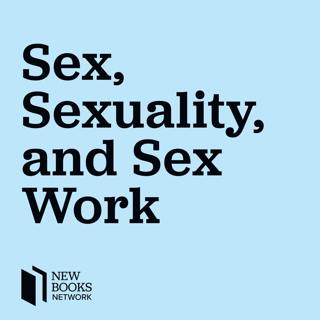
Susannah Drake, “Slandering the Jew: Sexuality and Difference in Early Christian Texts” (U of Pennsylvania Press, 2013)
In Slandering the Jew: Sexuality and Difference in Early Christian Texts (University of Pennsylvania Press, 2013), Susannah Drake, Associate Professor of Religious Studies at Macalester College, investigates the representations of Jewish sexuality in early Christian writings. She argues that there was a close connection between accusations of Jews’ sexuality/carnality and their misguided textual interpretation. We can learn from this ancient case study about the ways in which the representation of a group as sexually heretical is used to justify the use of force against that group. Learn more about your ad choices. Visit megaphone.fm/adchoices
11 Huhti 201633min

Afsaneh Najmabadi, "Professing Selves: Transsexuality and Same-Sex Desire in Contemporary Iran" (Duke UP, 2013)
In her fascinating new book Professing Selves: Transsexuality and Same-Sex Desire in Contemporary Iran (Duke University Press, 2015), Afsaneh Najmabadi, Professor of History and of Studies of Women, Gender, and Sexuality at Harvard University, explores shifting meanings of transsexuality in contemporary Iran. By brilliantly combining historical and ethnographic inquiry, Najmabadi highlights the complex ways in which biomedical, psychiatric, and Islamic jurisprudential discourses and institutions conjoin to generate particular notions of acceptable and unacceptable sexuality. Moreover, she also shows some of the paradoxical ways in which state regulation enables certain possibilities and spaces for nonheteronormative sexuality in Iran. In our conversation, we talked about problems of translation involved in using Western categories in Gender and Sexuality Studies in the Iranian context, the certification process for sex change applicants in Iran, shifting conceptualizations of transsexuality overtime, continuities and ruptures seen in nonheteronormative masculinities in Tehran before and after the 1979 revolution, and the category of the narrative self. This multilayered book is at once lyrically written and theoretically exhilarating. It will be of much interest to students of gender and sexuality, Islamic law, religion and science, and of contemporary Iranian society. It will also make a wonderful choice for graduate and upper lever undergraduate courses on the same subjects. Learn more about your ad choices. Visit megaphone.fm/adchoices
30 Joulu 201556min

Angelique V. Nixon, “Resisting Paradise: Tourism, Diaspora, and Sexuality in Caribbean Culture” (U Press of Mississippi, 2015)
It’s easy to conjure images of paradise when thinking of the Caribbean. The region is know for its lovely beaches, temperate weather, and gorgeous landscapes. For the people who live there, however, living in paradise means dealing with tourists, inequality, exploitation, and corruption. While many scholars have published critiques of... Learn more about your ad choices. Visit megaphone.fm/adchoices
2 Joulu 201546min

Nancy Bauer, “How to Do Things With Pornography” (Harvard UP, 2015)
We live in a world awash with pornography, in the face of which anti-porn feminist philosophizing has not had much impact. In How to Do Things With Pornography (Harvard University Press, 2015), Nancy Bauer takes academic philosophy to task for being irrelevant and argues that philosophers should emulate Socrates in giving people reasons to reflect on their settled views. Bauer, who is professor of philosophy and dean of academic affairs for arts and sciences at Tufts University, considers the sexual objectification of women in contemporary society from several overlapping angles. She discusses the sense of empowerment that young women feel in today’s ‘hookup culture’ and defends a radical new reading J.L. Austin’s work on language that is at odds with the standard interpretation behind prominent feminist critiques of pornography. She also considers how white male dominance in academic philosophy has contributed to its lack of effectiveness, while applauding recent efforts by some to increase its diversity and its engagement with the public. Learn more about your ad choices. Visit megaphone.fm/adchoices
15 Marras 20151h 12min

Juanita De Barros, “Reproducing the British Caribbean: Sex, Gender, and Population Politics after Slavery” (UNC Press, 2014)
As slavery came to an end in the Caribbean’s British colonies, officials and local reformers began to worry about how and whether they would convince their newly freed workforce to continue working. More specifically, they worried about underpopulation, and whether the formerly enslaved population was reproducing quickly enough. This was... Learn more about your ad choices. Visit megaphone.fm/adchoices
6 Loka 201557min

James E. Strick, “Wilhelm Reich, Biologist” (Harvard UP, 2015)
“Life must have a father and mother…Science! I’m going to plant a bomb under its ass!” The author of the line above – who scrawled it in his private diary in the midst of a series of experiments in which he thought he was creating structures that were some kind of transitional stage between the living and nonliving – had quite a life. A “midwife to the sexual revolution of the 1960s” who was famed for his work on the science of orgasm, was widely maligned as a charlatan and pseudoscientist, did extensive work on the science of cancer, had his books and instruments publicly burned by the US government, and died in prison: it’s hard not to find Wilhelm Reich fascinating. In his new book, James E. Strick reminds us that Reich was also a diligent and accomplished laboratory scientist whose work has potentially important implications for the modern biosciences. Wilhelm Reich, Biologist (Harvard University Press, 2015) takes readers into the making of this modern scientist, from his early relationships with Freud and dialectical materialism, to his work on the orgasm as a kind of “electrophysiological discharge,” to his research into potential treatments for cancer. The book concludes by considering why understanding Reich’s scientific work matters for us today, including a brief introduction to some recent experimental work related to Reich’s research. It is an absorbing story that’s also a pleasure to read, and pays careful attention to Reich’s scientific work while still translating it in clear terms for non-specialist readers. Learn more about your ad choices. Visit megaphone.fm/adchoices
6 Loka 20151h 9min

Phil Tiermeyer, “Plane Queer: Labor, Sexuality, and AIDS in the History of Male Flight Attendants” (U of California Press, 2013)
Today’s guest discusses the history of sexuality in the workplace through the lens of male flight attendants. We speak with Phil Tiemeyer about the shifts and changes in the airline industry across the 20th century. Phil steers us through this history and reveals the importance and difficulty of braiding together race, gender, and sexuality in a study of the labor and capitalism. Phil Tiemeyer is Associate Professor of History at Philadelphia University. He is author of Plane Queer: Labor, Sexuality, and AIDS in the History of Male Flight Attendants (University of California Press, 2013). You can read more about his work here. Learn more about your ad choices. Visit megaphone.fm/adchoices
14 Syys 201538min

Preston Lauterbach, “Beale Street Dynasty: Sex, Song, and the Struggle for the Soul of Memphis” (Norton, 2015)
Following the Civil War, Memphis emerged a center of black progress, optimism, and cultural ferment, after a period of turmoil. Preston Lauterbach joins host Jonathan Judaken for an in-depth discussion in advance of the launch of Lauterbach’s latest book, Beale Street Dynasty: Sex, Song, and the Struggle for the Soul of Memphis (Norton, 2015). Robert Church, Sr., who would become “the South’s first black millionaire,” was a slave owned by his white father. Having survived a deadly race riot in 1866, Church constructed an empire of vice in the booming river town of post-Civil War Memphis. He made a fortune with saloons, gambling, and–shockingly–white prostitution. But he also nurtured the militant journalism of Ida B. Wells and helped revolutionize American music through the work of composer W.C. Handy, the man called “the inventor of the blues.” In the face of Jim Crow, the Church fortune helped fashion the most powerful black political organization of the early twentieth century. Robert and his son, Robert, Jr., bought and sold property, founded a bank, and created a park and auditorium for their people finer than the places whites had forbidden them to attend. However, the Church family operated through a tense arrangement with the Democrat machine run by the notorious E. H. “Boss” Crump, who stole elections and controlled city hall. The battle between this black dynasty and the white political machine would define the future of Memphis. Learn more about your ad choices. Visit megaphone.fm/adchoices
4 Elo 201534min


















